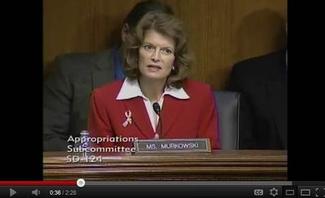Murkowski: Raising Royalties Will Reduce Production on Federal Lands
WASHINGTON, D.C. – U.S. Sen. Lisa Murkowski, R-Alaska, today questioned Interior Secretary Ken Salazar about his plan to raise royalty rates for oil development on public land from 12.5 percent to 18.75 percent. The senator’s questions came during a hearing of the Senate Appropriations Interior Subcommittee.
“America’s oil and gas producers have faced an increasingly hostile investment environment under the current administration that has resulted in less interest in federal leases. Secretary Salazar’s expressed interest in significantly raising the royalties paid by oil producers on public lands will only further persuade companies looking for oil to do so on state and private land,” Murkowski said. “If the administration wants to increase revenue from oil and gas production – something I fully support – then it should make more areas available for lease, instead of raising royalty rates and imposing new restrictions on producers.”The Department of the Interior recently commissioned a comparative study of 29 government oil and gas fiscal systems around the world. The analysis, Comparative Assessment of the Federal Oil and Gas Fiscal System, found that the United States is levying a higher government take than other jurisdictions relative to their remaining recoverable reserve ranking. The study also found that bonus bids – which can top $3 billion dollars in a single lease sale – aren’t being taken into account when the government assesses whether taxpayers receive a fair return on resource production. The study is attached.
The Interior Department raised offshore royalties and shortened lease terms in 2009. The predictable result, in combination with a less certain permitting regime, has been less successful lease sales. December’s lease sale in the Gulf of Mexico raised $300 million – less than a tenth of the $3.1 billion sale in the spring of 2008. Higher royalties and less regulatory certainty have failed to increase energy production or to lower gasoline prices.
###









